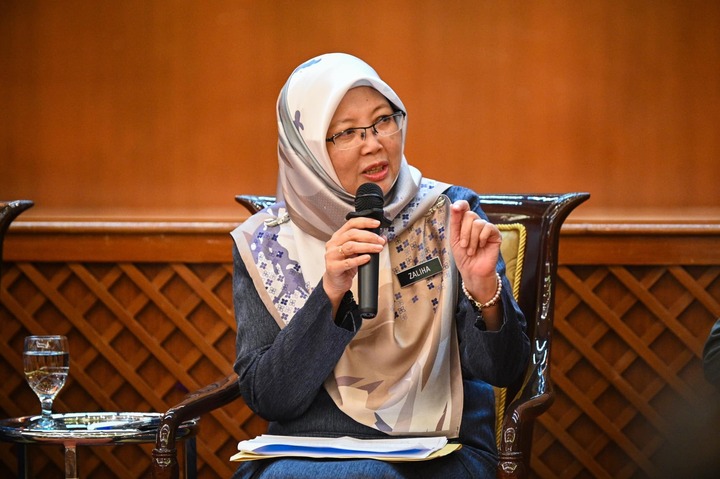KUALA LUMPUR, June 7 – The Ministry of Health’s (MOH) decision to award Pharmaniaga Logistics Sdn Bhd (PLSB) a new 10-year concession agreement to supply medicines to MOH facilities nationwide is partly due to its “excellent” delivery performance.
In a written Dewan Rakyat reply yesterday, Health Minister Dr Zaliha Mustafa said that PLSB, a subsidiary of Pharmaniaga Bhd, has a 98 per cent fulfilment rate in delivering orders within seven working days in Peninsular Malaysia and 10 working days in Sabah and Sarawak.
The health minister commended PLSB for its expertise in the supply and logistics services of medical products, stating that it is “on par” with renowned international logistics companies like DKSH and Zuellig Pharma.
PLSB has also successfully built a logistics network consisting of Bumiputera and local entrepreneurs throughout Malaysia. This network possesses the capacity for cold chain logistics, ensuring the proper handling of temperature-sensitive products, Dr Zaliha said.
“Based on PLSB’s performance, the government has agreed to the proposal of a new concession, namely the Medical Supply Logistics Service Concession, for a period of 10 years to manage the supply chain and logistics of medical products to MOH facilities,” Dr Zaliha said, in response to Bakri MP Tan Hong Pin’s question on whether the ministry is prepared to end Pharmaniaga’s monopoly as the concession holder for medicines and medical supplies to government hospitals and clinics.
“Experience and expertise are crucial elements in ensuring the smooth delivery of medical supplies to health care facilities,” the health minister said.
Dr Zaliha added that MOH’s privatisation concession with PLSB reduces the need for MOH facilities to keep excessive stock in their own storage, as they now have the flexibility to place orders without being bound by a minimum order requirement. These deliveries can be obtained within seven to 10 working days.
However, it was noted that for this system to work smoothly, the concession holder, or PLSB, must have a strong and sufficient financial position.
The health minister told reporters last April 18 that MOH has decided to renew its logistics and distribution concession with Pharmaniaga for another 10 years, despite the company’s inclusion into Bursa Malaysia’s Practice Note 17 (PN17) classification of financially distressed companies.
“We really need them and it is our responsibility to try and help them since it’s a GLC (government-linked company),” Dr Zaliha was quoted saying.
Pharmaniaga, which holds exclusive rights from the government to distribute essential medicines to public health care facilities, recorded its largest quarterly net loss of RM664.39 million in the fourth quarter ended December 31, 2022.
This was primarily due to the RM552.3 million impairment of Covid-19 vaccines. As a result of this significant loss and other financial indicators, the company’s board of directors has announced that Pharmaniaga has become an affected listed issuer under PN17.
According to Dr Zaliha’s written parliamentary reply yesterday, Pharmaniaga’s PN17 status – as understood by the MOH – is due to the company’s need to make accounting adjustments to comply with the Malaysian Accounting Standards and good governance practices.
“The PN17 status is a result of financial provisions for slow-moving stock of Covid-19 vaccines. However, the MOH understands that the PN17 status does not affect the operations of its subsidiary, PLSB, in managing logistics and distributing medications to MOH facilities nationwide,” Dr Zaliha said.
“Plus, Pharmaniaga Berhad is directly and indirectly owned by the Armed Forces Fund Board (LTAT) under the Defence Ministry.”
PLSB is the very same company that was identified in the Auditor-General’s 2021 report (Series 2) as having supplied 93 defective ventilators to the MOH in 2020 during the Covid-19 pandemic that cost the government an estimated RM13.07 million in losses.
Multiple government backbenchers yesterday, during Parliament’s historic debate on the AG’s report, slammed the problematic procurement and supply of the crucial breathing machines, with Rasah MP Cha Kee Chin from the DAP describing it as an “unforgivable” and a “very serious omission”.
Today, when answering the debate, Deputy Health Minister Lukanisman Awang Sauni largely defended the emergency procurement of the ventilators that he said had gone through “multiple” levels.
Galen Centre for Health and Social Policy chief executive Azrul Mohd Khalib previously warned of a potential disruption to the supply of critical medicines and drugs, in light of Pharmaniaga’s financial troubles.
For more than 25 years, Pharmaniaga held an exclusive concession to purchase, store, supply, and distribute over 700 pharmaceutical products on the Approved Products Purchase List (APPL). This represented more than a third of the government’s branded and generic drug supply. The GLC was also responsible for the logistics and distribution of these medicines.
Azrul said the government’s reliance on such exclusive concessions granted to individual GLCs has led to an unhealthy dependence on these companies. The situation makes companies like Pharmaniaga seem indispensable and “too big to fail”, which puts Malaysia’s public health care system at risk of significant disruption if these GLCs face financial difficulties. Pharmaniaga’s situation is a prime example of this issue, Azrul said.
In 2019, the government made a commitment to move away from concession agreements and adopt open tenders. But this was disrupted by the Covid-19 crisis and Pharmaniaga was granted multiple extensions.








